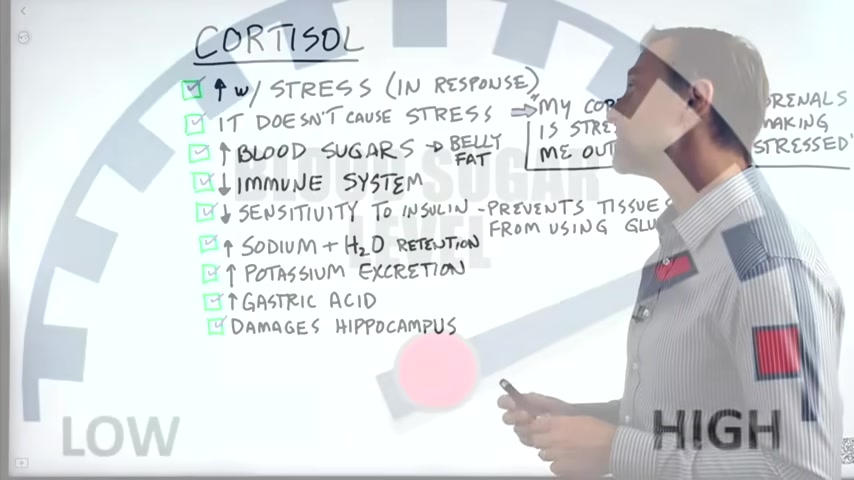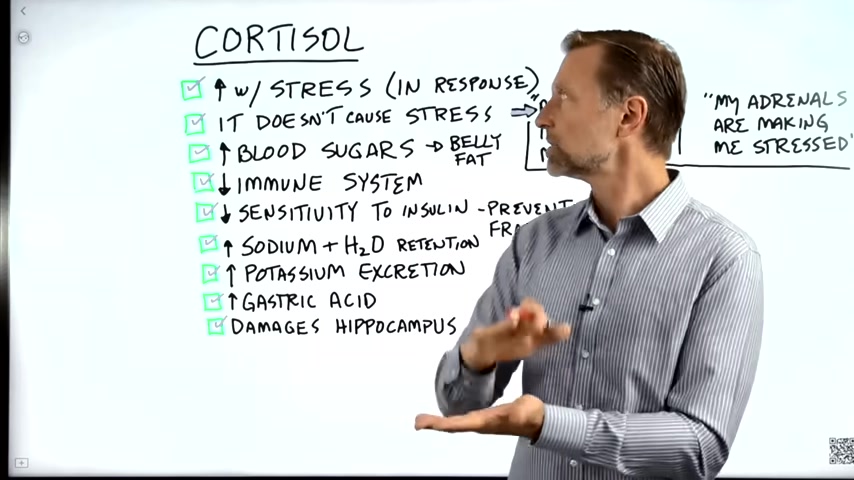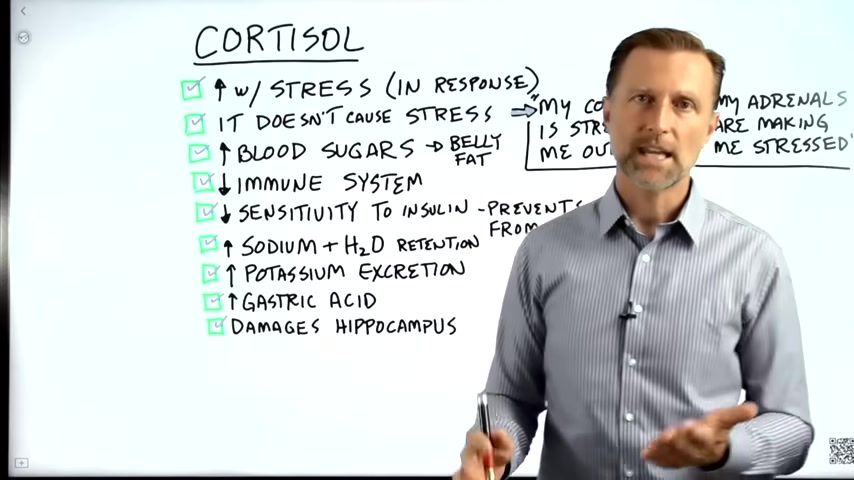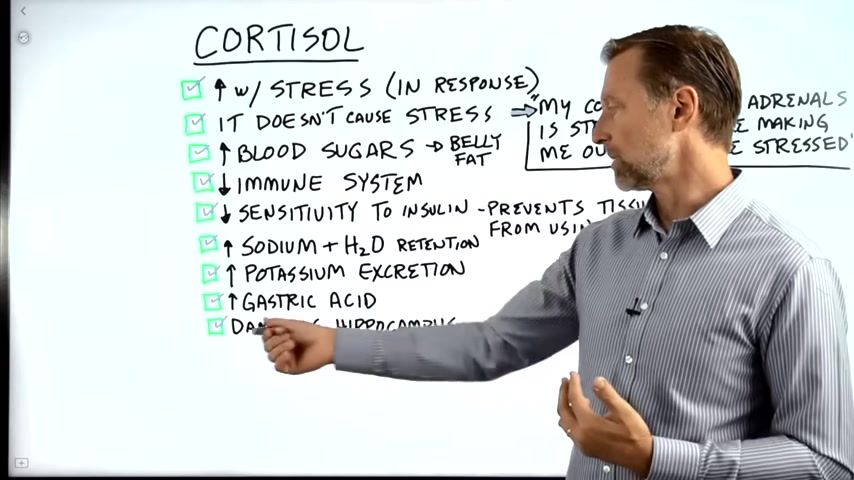
https://www.youtube.com/watch?v=vOsp52De41I
THIS is the Most Powerful ADAPTOGEN in The World - How it Works and Why it's THE BEST

So what is the most powerful adaptogen ?
Well , what is an adaptogen ?
An adaptogen is something that helps you cope with stress .
It helps you stabilize something called homeostasis .
So it's your body's adjusting to the environment .
So if you stood up really fast , right , and you get dizzy , that's not adjusting to your environment .
Your body should be able to quickly shift your blood pressure and shift the blood up into your brain so you don't pass out .
Or let's say you run up the stairs .
Right ?
Your body should adapt to that , and you shouldn't go unconscious .
So if there's a problem in your ability to adapt to stress , then an adaptogen can help you .
But most adaptogens focus on increasing your resistance to stress .
And the most powerful adaptogen that I know is ashwagandha .
Ashwagandha does a lot , but in this video , we're gonna primarily focus on how it can help someone with stress .

It's been around for a couple years , like 3000 years .
Many different cultures have used ashwagandha for all sorts of things , but primarily , most people use it to cope with stress .
The main chemical compound in ashwagandha that is responsible for this stress adaptation is withanolides .
And withanolides is kind of like a a category of 300 different similar compounds .
So what happens when you take ashwagandha is you start , feeling calm .
You feel like you can cope better , and I'm gonna talk about why .
Number 1 , it helps to modulate or control something called the HPA axis .
This communication between the hypothalamus , pituitary , and your adrenals .
Okay ?
So let's say you experience stress .
Right ?

So stress is received by the body , and the hypothalamus is like the owner of the football team that sends a message to the coach , which then sends the message to the quarterback to give the play out to get everyone on the same page .
So in other words , these hormonal communications are all about getting the body ready or adapting to a stress response .
And then once the hormone does its job , adapting the body to stress , then a signal is sent back turning off this mechanism .
And this is the problem with chronic stress .
That message never comes back to turn things off .
And so we have this chronic elevation of cortisol .
Now what's really cool about ashwagandha is it can help to turn off cortisol and another hormone called DHEA .
Now , when I talk about turn off , I'm not talking about completely , I'm talking about reducing it to a certain amount .


And so Ashwagandha in various studies , I think there's like roughly about 41 different studies just on stress alone , but there's a lot of other studies on a lot of different aspects of what it can do .
But in this 1 study , which I'm going to put down below , it can help reduce cortisol and DHEA .
Now the thing about cortisol , cortisol does not cause you to be stressed out .
Sometimes people say , boy , my cortisol is too high .
It's stressing me out or my adrenals are overactive and it's stressing me out .
No .
It's the stress that's causing the adrenals to pump out more cortisol .
Cortisol is there just to adapt your body to stress .
It's doing its job .
And the problem is if you're under sustained stress , it's just not very healthy to have your body in this state .
So let's just take a peek at what cortisol does .
Okay .
This is just some of the things that it will do .

Number 1 , I already mentioned this , it responds to stress .
It doesn't cause stress .
It's just adapting your body to a stress state .
So the first thing it's gonna do is gonna increase your blood sugars .
Okay ?
This is called the flight or fight mode .
It's a stress mode .
Like if there is a lion chasing you , you can either fight them or run away .
So it's quick energy .
It's increase or mobilize your blood sugars .
A problem with chronic stress is that sugar then will trigger insulin and convert to belly fat and a lot of other problems like high triglycerides , high cholesterol , and also it can burn out the pancreas and even cause diabetes if there's enough of this cortisol being pumped out .
The other thing that cortisol will do , it'll turn off certain things in our body that are not necessarily related to this present time threat .
Okay ?
So it temporarily turns off your immune system , so it just shuts the thing down .

This is why people take prednisone , for example , which is a synthetic cortisol for anything inflammation , autoimmune diseases , allergies , poison ivy , skin problems , lung infections , etcetera , etcetera .
So the immune system is temporarily put on pause .
Okay ?
The other thing that cortisol will do is it decreases the sensitivity to insulin .
Now this is not a good thing .
We want insulin very , very sensitive so it can regulate your blood sugar .
So if it makes insulin less sensitive , it actually creates insulin resistance .
What your body is trying to do is trying to prevent tissues from using glucose .
So it's trying to conserve and use that , glucose for energy .
Now it also will increase sodium and water retention .
This is why when people are stressed , they're just like a fluid filled sack , especially in their ankles .


At the same time , it increases potassium excretion .
So your body is getting rid of potassium and retaining sodium .
This is why when you're under stress for a period of time , you become even more potassium depleted and you hold on more sodium .
So this is just another reason why potassium is so important during a stress state .
So , but what do people do when they're stressed ?
They eat salty , crunchy carbs , right ?
Like potato chips or other chips , things like that .
What are they doing ?
You're increasing more blood sugar and more salt retention .
When cortisol goes up , we also get a spike in gastric acid .
So you may find that your stomach has , like , acid reflux or just heartburn .
And if stress goes on long enough , that can irritate and create inflammation in your stomach , and that's called gastritis .

This is 1 of the reasons why stress can actually create an ulcer and actually damage in your stomach .
But not just in your stomach , it can also damage the brain .
So chronic stress can actually cause some major damage to your hippocampus .
So then you start losing memory and the ability to learn and your cognitive function .
Alright .
Let's go back to this right here .
So ashwagandha can lower cortisol to a certain degree , as well as DHEA .
What is DHEA ?
It's kind of a precursor for cortisol and other hormones .
So this is elevated during stress .
And guess what ?
Ashwagandha actually can help lower this , which is a good indication that your body is less stressed .
If you have a lesser amount of DHEA , that's still within the normal range and you have a lesser amount of cortisol .

So based on this study , which is a double blinded placebo test , they found , lower AM cortisol .
So lower cortisol in the morning .
There was also lower DHEA in the morning .
There was a slight increase in testosterone because stress does shut down testosterone .
So the fact that it raised was , is a good thing .
Also , ashwagandha increased endurance .
Okay .
So you can go longer when you exercise , It increases strength .
Okay .
Because 1 of the things that stress does is it makes you weak .
And ashwagandha is really good for someone that feels weak after stress .
Like , let's say for example , you had some immune infection and you're trying to recover from that because and you feel really weak .
Ashwagandha is a really good thing to increase the strength .
Or let's say you've been under a lot of stress for many days , and you're not sleeping that well .


Ashwagandha can help raise your strength so you at least don't feel weak .
And ashwagandha showed significant improvements in emotions .
So ashwagandha has a tendency to bring you up so you're not stuck in this stress state .
Now , if you wanted a really good ashwagandha product , I did put a link down below in the description .
Check it out .
Now since we're on the topic of stress , you have to see this video on stress .
It is very very important .
I put it up right here .
Check it out .
Are you looking for a way to reach a wider audience and get more views on your videos?
Our innovative video to text transcribing service can help you do just that.
We provide accurate transcriptions of your videos along with visual content that will help you attract new viewers and keep them engaged. Plus, our data analytics and ad campaign tools can help you monetize your content and maximize your revenue.
Let's partner up and take your video content to the next level!
Contact us today to learn more.